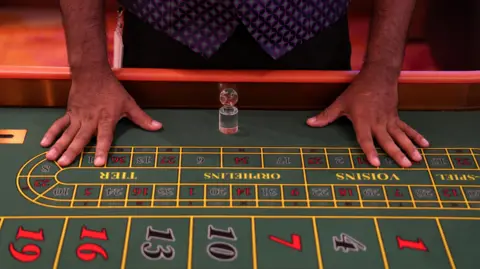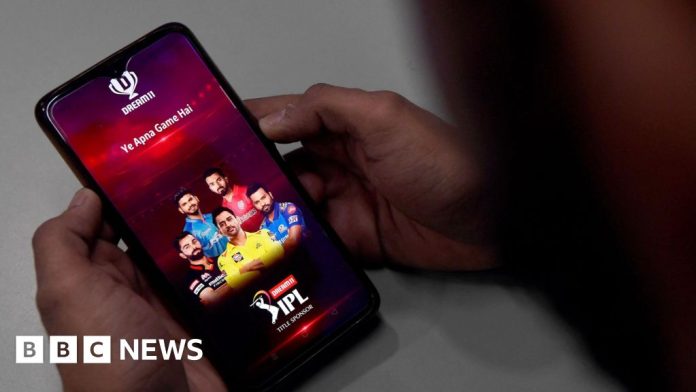Abhik Deb and Nikita Yadav
BBC News, Delhi

 AFP via Getty Images
AFP via Getty Images
Kartik Srinivas (name changed) still flinches at the mention of online betting. What began as a thrill to earn a quick buck spiralled into a five-year addiction that cost the 26-year-old his savings, peace of mind and nearly his future.
Between 2019 and 2024, Srinivas lost more than 1.5m rupees ($17,000; £13,000). The money included three years of his earnings, as well as savings and loans from friends and family.
“I tried everything – apps, local bookies, international platforms. I was hooked,” he says.
By 2024, he was neck-deep in losses.
Srinivas’ story reflects the darker side of India’s once booming Real Money Games (RMG) industry – where players use online platforms to bet cash on poker, fantasy sports and other games.
Days ago, India passed a bill to outlaw these games, arguing they had become increasingly addictive and were leading to financial distress among people.
The new law makes offering or enabling such services punishable, with a jail term of up to three years and a fine of up to 10m rupees. Promoting them carries penalties of two years and 5m rupees, though users are treated as victims, not offenders.
The government has defended the move as a way to protect consumers from gambling.
Federal IT Minister Ashwini Vaishnaw said online money games had harmed 450 million Indians, causing losses of over 200bn rupees and triggering “depression and suicides” among many. The source of this data, which was presented in parliament last week, is unclear.

 Getty Images
Getty Images
But many in the industry have called the ban a knee-jerk move, which they say has crippled a thriving sector and would hurt those it is trying to protect.
Before the ban, India had around 400 RMG startups that generated nearly $2.3bn in annual taxes and supported more than 200,000 jobs. One of them, Dream11, even sponsored India’s cricket team.
This is the first federal law to ban online betting platforms, though the sector has long faced scrutiny, with states like Odisha, Assam, Andhra Pradesh and Telangana already enforcing their own bans. In 2023, the federal government slapped a 28% tax on online gaming bets.
Yet, the industry has flourished, attracting big global investments and celebrity endorsements.
- Gambling worry as India firms bet big on online games
- Howzat? The clamour to legalise sports betting in India
- Viral European cricket league faces uncertain future
Mumbai-based gaming lawyer Jay Sayta told the BBC that the ban was a “massive setback” for investors who had pumped in millions of dollars into these startups.
He said that while there was a need for some regulation in the industry, the law was introduced in haste and without consultation.
Among the hardest hit are Dream11 – valued at $8bn and once the lead sponsor of India’s cricket team – and the $2.5bn-worth My11Circle, which is a partner of the Indian Premier League, the world’s richest cricket tournament. Both have shut real-money gaming operations.
One of the key contentions of the industry is that the law does not distinguish between “games of skill” – which involve decision-making, talent and knowledge – and “games of chance”, which rely purely on luck. It has banned both.
Several Indian high courts have in the past have held that online money games fall under the skill category and cannot be treated as gambling.
In Karnataka and Tamil Nadu, courts even struck down state-level bans on gaming platforms on these grounds. And in 2022, India’s Supreme Court upheld a Punjab and Haryana High Court ruling that classified fantasy sports as “games of skill”.
Smrita Singh Chandra, who earlier managed policy communications at Dream11, wrote on LinkedIn that the ban had been introduced “without transition, nuance, or consideration of economic realities”.
Mr Sayta noted that companies had invested and built their business models around these court rulings.

 Reuters
Reuters
Indian gaming federations argue that shutting down “regulated and responsible Indian platforms” will drive millions of players into the hands of illegal networks, offshore gambling websites, and fly-by-night operators who operate without any safeguards and consumer protections.
In many Indian cities, betting already takes place through local bookies who operate without oversight, which is often more exploitative than online platforms.
Wagers are typically circulated via WhatsApp or Telegram groups, where links are shared with hundreds of users at a time. Overseas gaming apps also remain within reach, as many use VPNs to get around restrictions.
But the government argues that even legitimate real-money gaming platforms run on “opaque algorithms” that makes it nearly impossible for users to win – a point some experts echo.
Vishal Gondal, co-founder of video gaming company nCore Games, told the BBC that in contests like online rummy (a popular card game) users often unknowingly play against bots.
Mr Gondal added that the algorithm of these bots are designed to favour the gaming platform, ensuring it almost always emerges as the final winner.
“These games essentially amount to gambling,” Mr Gondal said. “Calling them games of skill is like branding alcohol as fermented juice.”
But others like Mr Srinivas are shocked by the suddenness of the move.
Even though he no longer plays, he says that rising awareness about the harms of gambling would’ve been far more effective than imposing a blanket ban.
“At least with these apps there was some accountability – without them, things might get worse,” he said.
Follow BBC News India on Instagram, YouTube, Twitter and Facebook.
